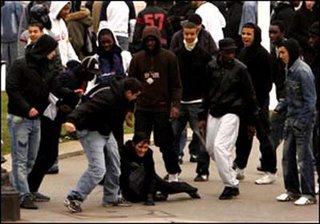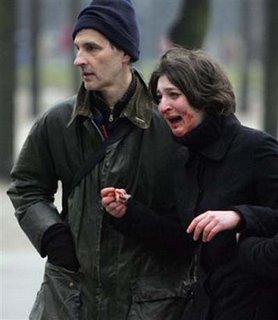"I am a modern man - the Beatles, colour TV - that's the generation I come from" - Tony Blair, 1997.
One of the things I'm interested in is documenting how it all went pear-shaped, what life was like before the Fall, the cultural drivers behind the destruction, the personalities involved, and some of the original documents.
This post will be a little disjointed, as it covers some big themes, each worthy of one or more essays - which I have neither the time nor ability to write.
There are several elements involved in this documentation. One important one is to bear witness. A key liberal myth, the "Myth of the Myth of the Golden Age" holds that crime wasn't REALLY lower in the past, streets weren't REALLY safer.
"He who controls the present, controls the past. He who controls the past, controls the future."At present this is a difficut task for our liberal elite. There are simply too many people alive who can remember Britain in the 1950s or even the 1960s (remember that the culture of the 1960s only spread in the 70s - and went mainstream even later, around the time Habitat stores opened everywhere. For an accurate picture of 1966 England look at the World Cup Final crowd - 95% in ties -
ties ! and many also sporting hats).
But these generations - the wartime generations - are dying and will soon be gone. Mortality is even now on the horizon of the post-war grammar school boys, the people - of whom I'm one - who destroyed the culture to which they were the heirs.
So it's important to record the lives and opinions of these generations, partly for their own sake, but partly to refute the arguments of those who believe that the present is always better than the past.
Three documents - two on the cultural drivers of destruction, one on Edwardian Britain.
First the Independent on the
50th anniversary of the play "Look Back In Anger", as reviewed by the late Keneth Tynan in 1956.
"All the qualities are there, qualities one had despaired of ever seeing on stage - the drift towards anarchy, the instinctive leftishness, the automatic rejection of 'official' attitudes, the surrealist sense of humour ... the casual promiscuity, the sense of lacking a crusade worth fighting for and, underlying all these, the determination that no one who dies shall go unmourned ... The Porters of our time deplore the tyranny of 'good taste' and refuse to accept 'emotional' as a term of abuse; they are classless, and they are also leaderless."I'm not quite sure what happened to to the underlying theme, but all the rest were representative enough - a small manifesto for the counterculture.
Another document - I must admit to never having heard of the Preston poet
Alan Dent - and having read some of his stuff I wish he'd never heard of Dylan Thomas. But his
"Memoria Technica" is important in that if you wanted to know what the Sixties were a revolt against, you'd only have to read this. All the themes are there. Namely :
Capitalism - indeed, paid employment of any kind - is dull and morally reprehensible. Success in this world is a token of moral worthlessness.
Here
society’s handshake was a pay-packet and slavery
for he was famous in his realm
in Leyland and Chorley
from Accrington to Darwen
in Lancaster and Blackpool and as far as Oldham
he had conquered with his charm
the blue-eyed father and slick commercial traveller
filled the emptiness of his life by selling
as vain men fill the emptiness in their lives by selling
selling themselves a dream of themselves
Church is a dull thing that the straight parents make us do.
freedom from the narrowness of a niggard isle
from sexless Wesleyism
and God drowned in the Ribble
dirty with Protestant profit
and freedom was in no choice but to choose
On dull Sunday evenings at six
tight-suited smart and calm
on the back-row wicker seats
in a plain poor dour building
in a rich pretentious zone
I want to get drunk and have sex with girls.
I took my pre-sex preaching
then pubwards quiet querying and queer
went on my usual crusading quimquest
Respectability sucks.
my dream was freedom from the boss and the bureaucrat
my dream was the death of deference
In its own way it's also a manifesto for change - and a manifesto triumphantly implemented - as the figures for church attendance and a walk down any High Street on a Friday night will bear out. Though not quite fully implemented - all over Preston small boys, neatly dressed, will even today trot off to their religious classes once a week, with greater or lesser enthusiasm. But they'll be clad in white, not Sunday best - and their classes are on Fridays. I can still remember the cheerful kids pouring out of the madrassa in Woodhead Road when I lived in Bradford.
What a contrast with a Victorian working man - the Blackburn poet
William Billington. What was that about the working class being uninterested in education ?
A dacent chap ull do his best,
An' eawt o' wod he's earnin
Ged th' owdest son a trade, an' th' rest
O' th' lads a bit o' learnin;
Bud iv he's eawt o' wark; wey then,
Unschollard, unbefriended,
His childer grow up into men—
Aw wod this war wur ended!("this war" being the American Civil War, which closed half the mills in Lancashire)
The third document I stumbled upon while trying to find some lyrics for an old 78 in my posession. The
Hubbard family archives contain the
unedited memoirs of Frances Roper (nee Hubbard), an upper-middle class Englishwoman of good Christian family, describing the first twenty-odd years of her life in Ealing, the Forest of Dean, and her aunt's orphanage in South London. Absolutely fascinating stuff.
Four salient points - the safety and order of the Edwardian world, the all-pervading influence of Christianity, the still rigid class structure, and (as anyone reading childhood memoirs of the era will recognise) the enormous contrast betwen the tighty regulated and rigidly enforced relationship between adult and child, where any adult's word was law in every sphere, and the freedom/liberty/license of children's relationships with each other. In George Borrow's memoirs he desribes gang warfare and running battles between schoolboys (with however, none of the knife-work you'd get in, say, London today) in the Edinburgh streets. Reading the passage where the village boys torment Frances' Downs syndrome brother, I was reminded of Laurie Lee's gang of Cotswold adolescents plotting to waylay and rape the village idiot - a mentally deficient girl.
(The cultural level of the respectable working class in late Victorian times was remarkable. When our decorators arrive the radio is the first thing to go on. Can't work without it. Once ...
"When we had the local painters and decorators in the house the most beautiful part-singing would re-echo throughout the place all day, as they, the maids, the daily woman and the scullery maid all joined in, each one taking his or her part in perfect harmony." )

